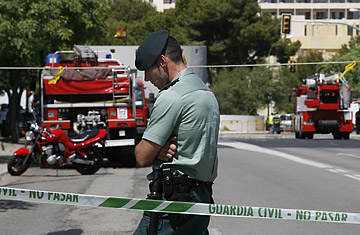
A civil guard is on duty while emergency services wait to evacuate the wounded from the civil-guards barracks of Calvia, on the Balearic Island of Mallorca, on July 30, 2009
When a handful of students in northern Spain got together in July 1959 to form a group dedicated to winning independence for the Basque Country, they could hardly have known that they would one day become Europe's longest-enduring terrorist group. This week, ETA (the initials stand for Basque Homeland and Freedom in Euskera, the Basque language) marked the 50th anniversary of its founding with yet more bloodshed: more than 40 people were injured by a bomb in the northern city of Burgos on July 29, and two civil guards were killed by another on the holiday island of Majorca the next day.
The attacks were not wholly unexpected. ETA often steps up its campaign of violence during the summer months, and in recent weeks Spain's Interior Ministry had heightened security at a number of sensitive targets across the country. It wasn't enough — the Burgos bomb was attached to a van parked outside a civil-guard barracks; the Majorca one was tied beneath a civil-guard car.
But while ETA's violent tactics are now taken for granted, the reasoning behind them is harder to fathom — it's been 50 years and, still, ETA hasn't achieved its aim. "ETA is going to interpret these attacks as a show of its own strength," says Rogelio Alonso, a terrorism expert at Madrid's University of King Juan Carlos. "But it's a strength that's more fictitious than real."
For years, the story of ETA has been the story of its decline. In the past decade — and especially after the failure of a 2006 cease-fire — the combination of increased police effort, greater cooperation between authorities in Spain and France (which ETA, desiring independence for the French Basque-speaking territories as well, frequently uses for safe houses, logistics-planning and weapons storage), a growing public weariness with the group's tactics, and factionalism within the organization itself, has resulted in an ETA that is, by all accounts, at its weakest in its history. The arrests of several high-ranking leaders in 2008, as well as the roughly 750 etarras (ETA members) currently serving prison sentences, have shattered the hierarchy and structure of the group's once strict commando system, forcing it to rely more heavily on ill-trained legales (mercenaries hired to carried out its attacks).
It wasn't always this way. In the 1970s, burnished by a romanticized image of its members as revolutionaries fighting Francisco Franco's authoritarian regime, ETA assassinated Luis Carrero Blanco, the Prime Minister whom Franco had picked to succeed him. By the end of the decade, it had killed hundreds more people. And in the 1980s, the clandestine organization carried out a series of highly visible attacks: a car bomb parked at a Barcelona department store in 1987 left 21 dead; another, in 1986, exploded as a convoy of civil guards passed, killing 12.
But for all their force, none of those attacks got ETA what it wanted: negotiation with the Spanish government over independence for the Basque territories in the country's north. So why, then, when the organization is weaker than ever and has lost any immediate chance of restoring the peace process after it broke the 2006 cease-fire, does it continue to use violence as a political weapon?
Certainly, some within the group still see violence as playing a persuasive role, whether that means attracting new members or keeping those already involved. "Terrorist violence always acts as a kind of propaganda that is fundamental for maintaining group unity," says terrorism expert Alonso. But with the organization in decline, violence also has an obscuring effect. "Now it's become a way for a considerably weakened ETA to hide the fact that with firm action from the state, an unstoppable process of disintegration would begin," he adds. If the 2006 peace process is any indication, that firm action would have to couple a police crackdown with concessions — such as amnesty or a transfer of ETA prisoners to jails in the Basque Country to make it easier for their families to visit — which, so far, have proved political suicide for whichever party is in government.
For Ignacio Sánchez-Cuenca, a sociologist at Madrid's Cumpletense University who specializes in ETA, the answer to why ETA continues its violent fight is more chilling. "From ETA's own internal communications we know that they themselves can no longer justify the violence," he says. "They realize they're not going to get negotiations. They realize they're not going to radicalize the [mainstream] Basque Nationalist Party. They have no theory of violence anymore. For the past three or four years, it's been purely reactionary. It's all they know how to do."
This inertia of habit may ensure that after 50 years, even a debilitated ETA could be hard to eradicate. "Think of those communist parties in Western Europe, or neo-Nazi groups, who don't have the slightest chance of ever returning to power — they're still around," Sánchez-Cuenca says. "An organization is a lot harder to kill than an individual."
Download the new TIME BlackBerry app at app.time.com.
